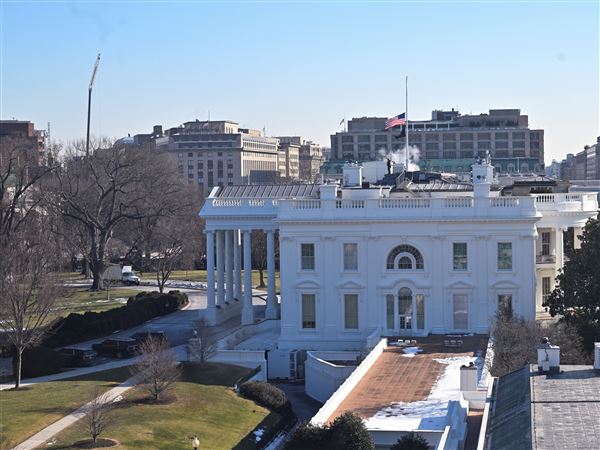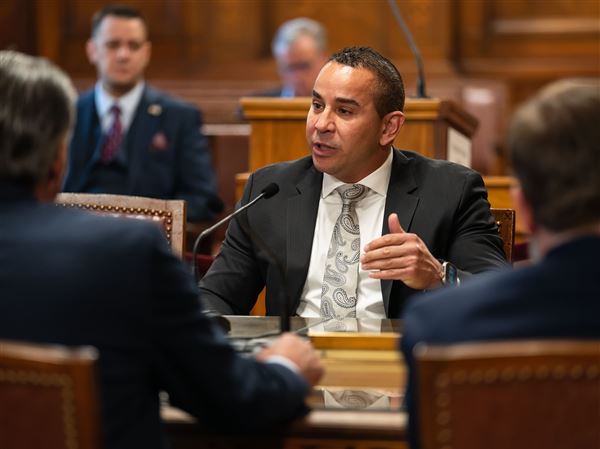The bluebird nesting boxes are full of hungry chicks, and umbrella-like leaves shade the long red row of rhubarb on Carole and Bob Valentine's 10 rural acres, hard against the Ohio-Pennsylvania state line in the northwest corner of Lawrence County.
Neither the bluebirds nor the rhubarb knows what the Valentines know: This slice of land they all call home is in the cross hairs of a landmark and precedent-setting legal battle over whether Hilcorp Energy Co. can use "forced pooling" to drill and hydraulically fracture the Utica Shale underneath the Valentines' property and take their gas -- even though the couple have repeatedly turned down company offers to lease the drilling rights.
"We are right dead center in the bull's-eye," said Mr. Valentine, a factory worker and former steelworker, who has lived on his green piece of West Middlesex for more than 30 years. "We told them no, and they say they're going to take our gas anyway. It's stealing our gas and our rights, and I think we have to stand up for our rights here."
Earlier this month the Valentines and the owners of two other properties, Martin and Suzanne Matteo and Steve Emery, filed a lawsuit saying they don't want to sell the shale gas they own, and asking the state Commonwealth Court to stop Hilcorp from taking the gas under their properties.
A court decision that allows Hilcorp to pool and tap the unleased Utica Shale gas might also open the door for new state legislation that would allow "forced pooling" for unleased Marcellus Shale properties too. That would be a major expansion of existing law that raises property-rights questions and could also prove politically problematic. Gov. Tom Corbett who has embraced shale gas development, is opposed to "forced pooling," having called it "private eminent domain."
Ms. Valentine said she and her husband turned down multiple lease offers from Hilcorp landmen because they don't like the disruptions, air pollution, truck traffic, spills and noise drilling has caused in nearby communities.
"Most of the people around here sign leases for the money, but that doesn't mean anything to us," she said. "We like nature and wildlife. And we own the property and pay taxes on it. If we don't want to sell our mineral rights, we won't. Under the constitution we have that right."
Welcome to the 'Pulaski Accumulation'
But the Houston, Texas-based drilling company, citing provisions of the state's Oil and Gas Conservation Law of 1961 that allow the "involuntary integration" and extraction of certain unleased oil and gas holdings, has applied to the state Department of Environmental Protection for a permit to drill Utica Shale formation gas from 3,267 acres in northwest Lawrence County and southwest Mercer County.
Hilcorp calls the area, about 55 miles northwest of Pittsburgh, the "Pulaski Accumulation." It includes 3,232 acres the company has under lease agreement, and approximately 35 acres where the Valentines, Matteos, Emerys and two other property owners have declined to lease their land.
The Hilcorp permit application is the first in 30 years to invoke the "forced pooling" provision of the 53-year-old law, according to the DEP. It's also the first time the law has been used to justify a permit proposal for an "unconventional" shale gas well development, which uses directional drilling and "fracking," which injects millions of gallons of water, chemicals and sand to crack the shale formation and release the gas it holds.
The DEP has appointed a hearing officer, Michael Bangs, an attorney from the Harrisburg area, to oversee the public hearings required by the law before the unleased subsurface shale oil and gas acreage can be pooled into the proposed drilling area and Hilcorp's "well spacing" permit proposal can be approved.
Morgan Wagner, a DEP spokeswoman, said hearings on the Hilcorp permit application, originally scheduled for earlier this month, have been postponed until Commonwealth Court rules on the case.
"The court will make a decision on the constitutionality of applying the law to the Utica," she said, "so it makes no sense to proceed with the hearings while the court is considering a decision that will control the outcome of the permitting."
Hilcorp opposed the hearing postponement, and in a May 6 filing asked Commonwealth Court to order the DEP to reschedule a new hearing date. The court has taken no action, and Daniel Craig, an attorney representing Hilcorp at Burleson LLP in Canonsburg, declined to comment on the case.
Hilcorp also declined to answer questions about the lawsuit, whether the company's use of the 53-year-old law would set a precedent for use throughout the state, or why the company can't or won't drill around the unleased properties.
The company did issue a statement saying it has leased 99 percent of the acreage in Pulaski Accumulation, and the hearing process is about "protecting the rights of those landowners -- and their families -- to ensure they have the opportunity to benefit from their mineral ownership in a safe and efficient manner."
One of those landowners is Vince Tutino, who has leased the oil and gas rights under an undeveloped, 140-acre parcel to Hilcorp and would like to see drilling proceed.
"I can understand people having concerns, and if they don't want to participate it's their choice, but I take exception to their concerns denying me the right to lease my gas," Mr. Tutino said. "I think drilling in the Utica and Marcellus shale is good for the local economy. I've watched gas operators drill and it doesn't look that intrusive to me."
'This is a takings case'
Commonwealth Court will ultimately decide if the little-used Conservation Law's provision allowing use of "forced pooling" trumps private property rights and prohibitions against using state eminent domain powers to benefit private corporations.
Omar Abuhejleh, the Pittsburgh attorney representing the three landowners who brought the lawsuit, said Hilcorp's proposal is unconstitutional and violates the state's eminent domain code because it would take private property for Hilcorp's private, for-profit, enterprise. The lawsuit he filed asks the court to temporarily and permanently enjoin shale gas drillers from using the Conservation Law to justify drilling into shale holding unleased oil and gas.
"Hilcorp wants to take their gas. This is a takings case," Mr. Abuhejleh said. "The issue here is forced pooling and what the property owners' rights would be if they are integrated into the pool."
He said the Oil and Gas Conservation Law was passed to prevent the waste of the state's gas and oil resources due to over drilling by competing drilling companies, and also to protect the correlative rights of neighboring landowners. More than 40 states have similar but not consistent laws, most of them passed 50 or 60 or even 70 years ago, and for the same reasons.
The law does not apply to the shallower Marcellus Shale because Pennsylvania lawmakers in 1961 limited it to oil and gas reserves located below the Onondaga formation so as to reduce wasteful over drilling, but not disrupt the drilling industry's existing chaotic shallow well developments.
Mr. Abuhejleh said it also should not apply to shale gas wells that can be drilled horizontally under an unleased property and into a shale seam where the gas is trapped.
"The shale gas stays in the shale until it is drilled into, fracked and released, so the correlative rights of the property owner are protected," he said. "And since the gas remains in the shale, the waste provisions don't apply either."
But that isn't what happens underground or legally, said Terry Engelder, a Penn State University geoscientist, who has been a longtime booster of shale gas development in the state.
He said fracking "can't be controlled" horizontally, sometimes cracking shale and releasing gas as much as 2,000 feet from the end of the well pipe, even under adjacent, non-leased property. And, he said, although the oil and gas are locked into the shale, they are still treated as "fugitive resources," which means they aren't owned by the surface property owner until they are extracted.
"There are oil and gas rules that haven't been tested in Pennsylvania and this is an incredibly important issue in terms of how we move forward in developing shale gas in the state," said Mr. Engelder, who as a member of the governor's Marcellus Shale Commission recommended amending the Conservation Law to allow "forced pooling" for Marcellus Shale drilling too.
Both the Marcellus Shale Coalition and the Pennsylvania Independent Oil and Gas Association, the state's two major industry lobbying organizations, have advocated expansion of forced pooling, which the industry calls "fair pooling" because it ensures that even landowners that don't sign a lease receive royalty payments.
But Mr. Engelder acknowledges that there is little political support.
"I think 30 of the 33 members of the governor's shale commission voted in favor of expanding pooling to the Marcellus but the governor viewed this as an eminent domain issue not a correlative rights issue, and he had the final say," Mr. Engelder said. "Right now the Utica is treated differently than the Marcellus and I'm not sure the industry can muster enough support to get that changed."
'The shale is not a pool'
But the Hilcorp case may hinge on the even finer point of whether the pooling arrangement in the 1961 law is technically applicable to the fracking and collecting of shale gas, said John C. Dernbach, a law professor and co-director of the Environmental Law Center at Widener University.
"The shale is not a pool, so there is a threshold legal question of whether the language in the statute makes sense for shale gas extraction," Mr. Dernbach said. "Fracking under someone's land where you don't hold a lease, cracking the rock under that land is I think different than the capture rule, which allows drillers to drain gas and oil from a common reservoir under adjacent properties.
"But whether technically all the issues with spacing and pooling set out in the 1961 law make any sense for hydraulically fracturing the Utica Shale, I can't answer that."
It's an easier question for Suzanne and Martin Matteo, who bought four acres of land in West Middlesex seven years ago and don't want to lease their gas rights.
"We saw no benefit to the drilling, only the potential for harm," said Ms. Matteo. "We were worried about our water, our air, our home value decreasing and the kids getting sick. By not signing a lease, we can keep them back away from my four acres and that's my right."
"Hilcorp targeted us, but its goal long-term is to do this everywhere else, all over the state," said Mrs. Matteo, because the Utica Shale formation runs under all but five counties in Eastern Pennsylvania. "I never wanted to fight fracking, but it's something that's happening all around me and it has scared the hell out of me."
Don Hopey: dhopey@post-gazette.com or 412-263-1983.
First Published: May 18, 2014, 3:48 a.m.

















